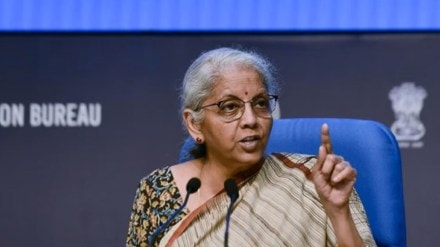The government will be open to the idea of relaxing investment curbs on China but the northern neighbour should also be willing to bring down barriers to India’s exports, Finance Minister Nirmala Sitharaman said on Friday.
In an interview with CNBC-TV18, the minister said New Delhi and Beijing must hold meaningful discussions on market access and non-tariff barriers. She said a long-term trading partnership “will take time” to develop and needs “sincere engagement” from both sides.
“Market access has not been realised despite our decade long engagement with the Chinese. In between, everything had come to a halt. We need to have a meaningful conversation. The products we want to export to China go through different destinations. Why can’t it go directly?” Sitharaman, who has earlier held charge of the commerce and industry ministry, said.
Balancing trade: The condition for relaxation
On the impact of 50% US tariffs on the overall economy, Sitharaman said reforms like the goods and services tax (GST) and other measures will offset it.
She said that the government would come out with something to hand-hold those who are hit by the 50% tariffs by the US. “There is a package that consists of very many different ways in which we want to help them. We will wait for the cabinet to clear it,” she said.
Sitharaman also said the country will continue buying Russian oil. “Where we buy our oil from, especially a big-ticket foreign exchange item where we pay so much, highest in terms of import, we will have to take a call on what suits us best,” Sitharaman said. “We will undoubtedly be buying.”
On White House adviser Peter Navarro’s comments that the South Asian nation has become a ‘laundromat’ for Kremlin, Sitharaman said the global diplomatic world is “astonished that such kind of expression is being used for India”. She added that “those in the diplomatic area will respond or deal with it”.
Navigating global pressures and domestic fiscal health
On the high borrowing costs in the domestic bond market, she said they are not ‘affordable’ when interest rates in the economy are low. “I won’t say I am concerned, but I am observing it,” she added.
“Also at a time when interest rates are otherwise low, bond yields becoming unsustainably high has a big bearing on the government,” Sitharaman said. Yields on the benchmark 10-year bonds have risen 30 basis points in the last three months primarily on worries over a potential end to the central bank’s easing cycle, as well as potential fiscal slippage from any support to shield the Indian economy from punitive US tariffs. India, she said, will adhere to the fiscal deficit target of 4.4% for the current fiscal year ending March. “This is the last point of the glide path and I plan to adhere to it,” she said. “My fiscal math so far is absolutely fine.”
